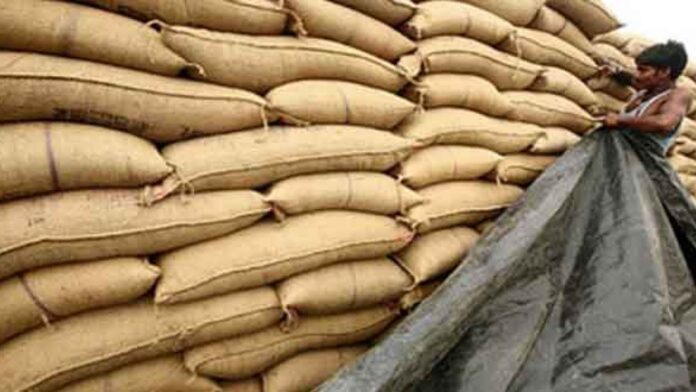ISLAMABAD: Despite a proposed hike to Rs 52/kg, the government of Gilgit-Baltistan (GB) has opted to fix the price of subsidised wheat at Rs 36 per kilogram. Despite this, the opposition parties, the Awami Action Committee, and the public in GB adamantly advocate maintaining the previous subsidized rates for this essential household staple.
Chief Minister Haji Gulbar Khan announced the revised price on Saturday, underscoring the objective to stabilize wheat prices and ensure fair returns for local farmers. As per the minister, the decision aligns with the growing demands from various quarters for equitable pricing and accessibility to essential commodities across the region. Previously, the price for subsidised wheat was increased from Rs 20 to Rs 32 per kg in November.
The specified rate of Rs 36/kg translates to a standard price of 3600 rupees per bag of wheat, with an allocated quota of 7 kilograms per individual. This strategic move by the GB government aims to address concerns related to wheat pricing and distribution, ensuring availability for the local populace during the winters.
This policy shift underscores the government’s dedication to promoting agricultural sustainability and fair pricing mechanisms. The announcement is expected to benefit both farmers and consumers, providing stability to the wheat market in Gilgit-Baltistan.
Simultaneously, responding to protests and the shortage of wheat subsidies, the federal government has initiated discussions on the matter. A crucial meeting at the Ministry of Finance highlighted alleged negligence by the GB provincial government, raising concerns about wheat scarcity in the region.
Reports indicate that the decision to hike wheat prices in GB was unilateral, lacking consultation with federal authorities or relevant committees. This unilateral move triggered discussions within federal departments to find a viable solution, considering widespread discontent over the alteration of wheat subsidies in Gilgit-Baltistan.
The proposed solution emphasizes exclusive local wheat supply to GB to stabilize the subsidy from Rs 146 to Rs 125 per kilogram. However, despite potential incremental revenues, a shortfall of over 5.6 billion rupees remains, necessitating 9.5 billion rupees from federal subsidies and 5.7 billion rupees from wheat sales.
The Ministry of Kashmir Affairs has committed to covering the additional cost of over 5 billion rupees until the fiscal year-end to ensure uninterrupted wheat supply. The provincial government’s decision to increase prices will be withheld until a practical mechanism is developed to guarantee stable wheat prices while addressing subsidy concerns. This development signifies ongoing efforts to strike a balance between economic sustainability and public welfare in Gilgit-Baltistan.
Why subsidized wheat in GB?
The strategically located mountainous region of Gilgit-Baltistan (GB) has long relied on subsidized wheat from the central government due to limited cultivable land. Initiated in the 1970s by Zulfiqar Ali Bhutto’s government to aid the impoverished locals, the subsidy, now exceeding Rs 10 billion, faces challenges in meeting the region’s increasing wheat demand.
A significant protest in 2017 highlighted tensions when the federal government sought to cut the subsidy, prompting the GB government to raise prices. The center later reversed the decision, absorbing additional costs in the budget. Presently, the center urges the regional government to raise prices by 70%, aligning with the increased wheat quota allocated in the subsidy.
While the subsidized wheat addresses GB’s food security needs, it has adversely affected local farming systems. The incentive to produce local cereal crops diminishes as subsidized wheat becomes a cheaper alternative. Cultivable lands are now diverted to other crops, impacting wheat production.
GB faces an annual cereal deficit of 150,000 tons, mostly supplied through subsidized wheat imports. Past stability in wheat flour prices at PKR 50 per kg has surged to PKR 150 per kg, posing challenges for the GB government’s budget allocation of PKR 7 to 8 billion.
To maintain the subsidy, the GB government would need an annual budget exceeding PKR 20 billion, an improbable scenario given fiscal constraints. The impact of subsidized wheat on GB’s economy and agriculture necessitates a targeted subsidy approach, excluding the top socio-economic stratum from subsidies.
Previously, the assembly announced that government servants above grade 17 and people earning more than Rs 40,000 per month will be exempt from this subsidy.
Opposition’s take:
In justifying their demand for maintaining the subsidy, opposition parties and civil society in GB argue that the subsidy provided to the people of GB, when compared with subsidies granted to individuals in other parts of the country, is merely the tip of the iceberg. They contend that, given its constitutional dispute status, the region has been deprived of its constitutional and basic rights for over 75 years. Additionally, they assert that the region lacks compensation for water supply and a fair share in the income generated by the tourism sector.
In a statement, the opposition parties, along with those united under the umbrella of the Awami Action Committee, have announced plans to launch protests across GB if the decision to increase prices is not reversed.
























